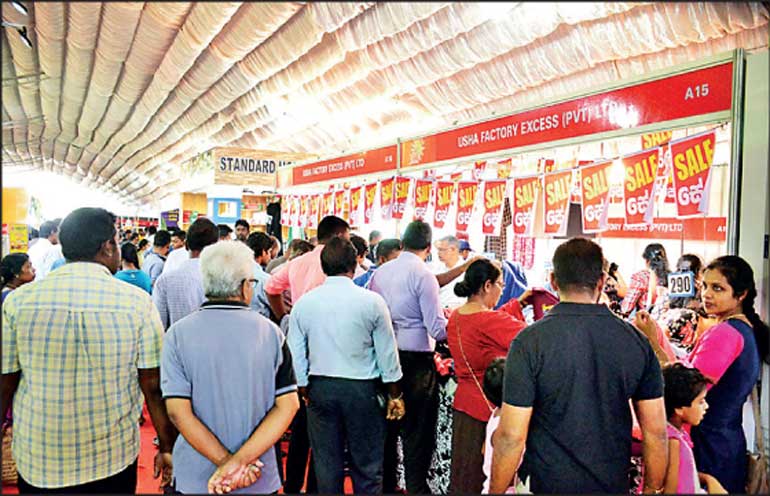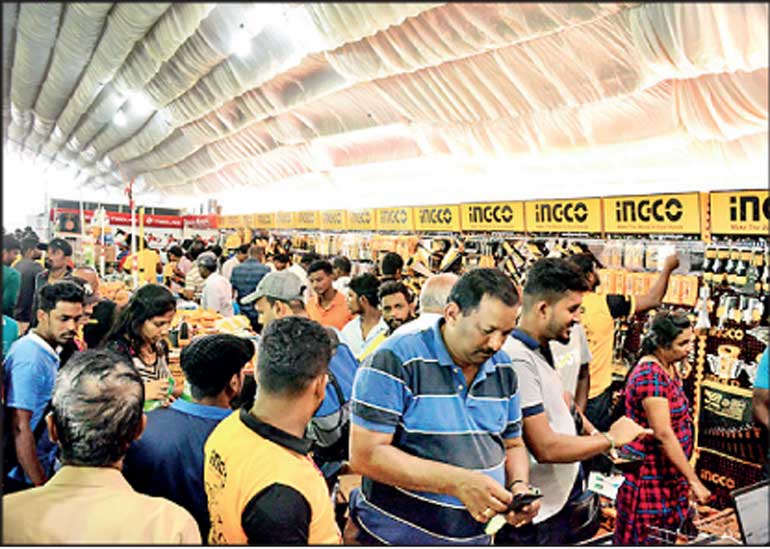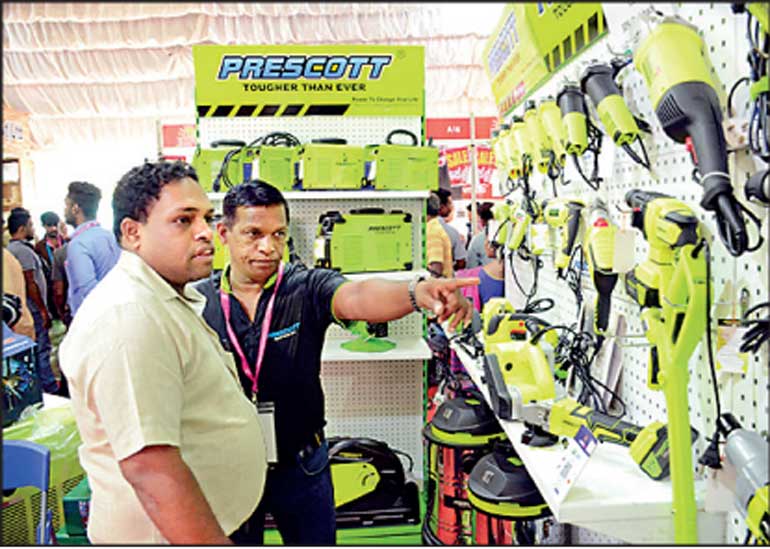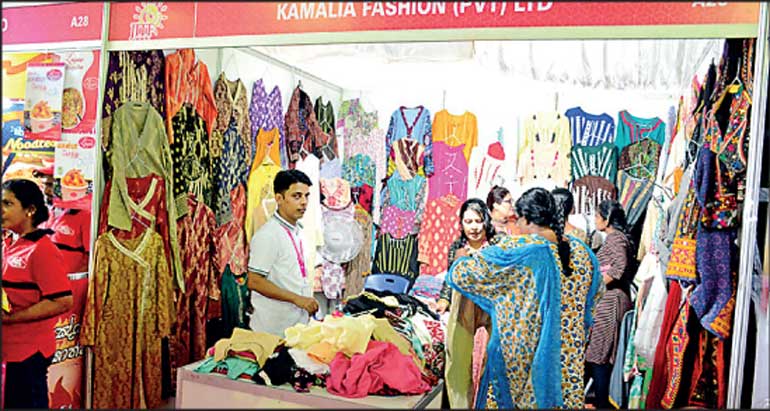Saturday Feb 21, 2026
Saturday Feb 21, 2026
Saturday, 22 January 2022 00:34 - - {{hitsCtrl.values.hits}}
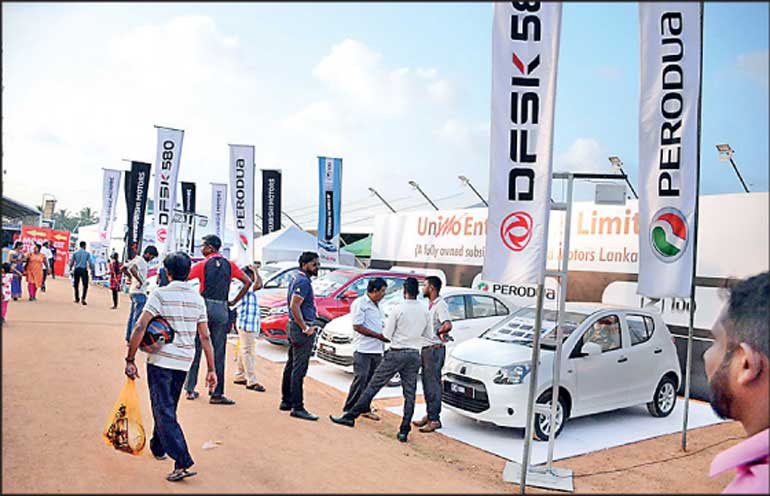
The three-day Jaffna International Trade Fair kicked off yesterday at the Muttraweli grounds showcasing the North industry and services from different parts of the country but especially those of the host district.
Entrepreneurs and industrialists from Kilinochchi, Mullaitivu, Jaffna, Vavuniya and Mannar will participate at the event.
The Jaffna International Trade Fair will be heralding economic activity for the new year between the North, South and other regions of the island and is to be followed up later in the year by a new entrant to the list of events: a Galle trade fair, states event organiser Lanka Exhibition and Conference Services Ltd., (LECS) CEO Aasim Mukthar.
The LECS has made the Jaffna Trade Fair a consistent occurrence every year for the past 12 years with the exception of the recent vacuum on account of the COVID pandemic. The international trade fair in Jaffna, held with the participation of foreign companies, including those from Thailand and India, is organised in collaboration with the Yaarlpanam Chamber of Commerce, the primary driver of the event and endorsed by International Business Council, the Ministry of Industry and Commerce and the Consulate General of India in Jaffna. The Main Sponsor for this year’s event is Insee Cement and Ruhunu foods tied up to become the Official Food Partner for the event. The official Telecommunication Partner is Mobitel Ltd., who has been part of the event for 12 consecutive years since 2010. Official Safety and Hygiene Partner is Sun Match Company Ltd.
Mukthar stresses that the LECS prioritises linking the country through local entrepreneurship promotion and is open to working with those who have such ideals, thus promoting local industry for peacebuilding. Among the regions it has organised trade fairs so far include Jaffna, Batticaloa and Kandy with Galle to be the next district level new entrant this year.
The 2022 Jaffna International Trade Fair will see the launch of a program targeted at youth and young adults in Jaffna, aimed at empowering and inspiring youth towards self-development and business development, and focusing on knowledge sharing, skill development, mentoring, job and networking opportunities for first-time entrepreneurs.
Speaking of the founding and subsequent journey of the LECS within Sri Lanka Mukthar explains that the exhibition series started its operation in the year 2001 and since then has grown to be one of the leading trade fair organisers in the country. It has held more than 100 trade fairs promoting Sri Lankan industries both small and medium scale.
“Most of our shows display local participation with the exception of a few. The company has invested heavily in taking the concept of a trade fair all around the country. Founded by prominent businessmen, LECS established its identity as a trade facilitator for many industries in Sri Lanka,” he says, pointing out that the company has strived during many economic fluctuations to continue the trade events and that it will continue to do so in the times to come.
He points out that the exhibitors for both the Jaffna trade fair and others have an 80% repeat participation rate. Mukthar points out that the biggest hurdle for the current year is the COVID pandemic where the exhibition and trade events were the hardest hit among industries. “We couldn’t do any shows for nearly two years. Even with the current permission to do the exhibitions and sales, it is a restricted version we are working with, with lowered participating numbers and strict health guidelines. We have followed all rules put out by the health authorities and have scaled-down the 2022 event by half,” Mukthar explains.
He points out that for the past five editions LECS has given free of charge over 40 stalls to the Yarlpanam Chamber of Commerce, who organises the event in the North to resell to small-time traders of the region at a reduced cost.
Yaarlpanam Chamber of Commerce and Industries former Head K. Poornachandran highlights the potential of the North to be one of the leading business hubs of Sri Lanka while retaining its unique spiritual and cultural heritage. An electrical engineer and pioneer in the fibreglass boat making industry, with a factory in Gurunagar, Poornachandran is the Chairman of Star Industries Services Ltd., dealing with electrical and services connected with refrigeration, marine engineering, manufacturing of fibreglass boats, playground items and water tanks. Among the accolades he has received for his contribution to the industry in Sri Lanka is the Presidential Award for machinery in 2007 and 2008.
Poornachandran explains that the Jaffna trade fair has the potential for emulation and motivates other Lankan stakeholders to organise similar North centric events dedicated to entrepreneurship boosting. Poornachandran explains the business creation process as one that connects a nation and cites the example of the interaction between Jaffna and Kurunegala where the Yarlpanam Chamber of Commerce and Industry has an understanding with the Kurunegala Industrial Service Bureau (ISB)
He notes that Kurunegala is the fastest developing district in Sri Lanka in terms of entrepreneurship, industry, trade and services, explaining that it is so because it has an efficient and non-corrupt Industrial Service Bureau (ISB) established under the North Western (Wayamba) in 1990. The ISB helps accelerate industrial development within the province where there is an independent body of experts facilitating a hassle-free and transparent process for those who want to invest in the area and to assist boost local industries. He states that Northern industrialists have been calling for a similar process to be set up in Jaffna that will help steer the district forward to be a hub of industry. This will not only result in the social upliftment of the Northern people but also contribute to the national economy, he notes, stating that this has been achieved in Kurunegala.
“Kurunegala is an entrepreneurial city. It has been developing gradually for over three decades. The businesses that are being set up in Kurunegala range from vast scale technology-related ones to small scale ventures ranging from those such as batik to jewellery.” Kurunegala has an industrial park, in an industrial zone facilitated through the ISB process.
The current vacuum in Jaffna in having an ISB related mechanism for spearheading business development is temporarily filled by an official understanding with the Kurunegala ISB for technical assistance where needed for North industry establishments.
Setting up engineering-related industries that absorb new technologies, as well as Sri Lanka’s traditional knowledge, is what a district such as Jaffna needs, he points out.
Promoting agro-industries in the North capitalising on the natural resources of vast land areas of Mullativu and Killinochchi is a vital and timely need, he states. Policy level initiatives to solve the post-2009 land issues of the people where many cannot access or claim ownership of their property is needed for the full potential of agro-industries to be achieved.
Yaarlpanam Chamber of Commerce and Industries CEO Jurison Jenaraj echoes the need to boost agriculture and agro-industries of Jaffna to counter food insecurity.
He recalls the situation in the 1960s when Jaffna, despite dry weather and arid soil, was still proficient in using many natural processes and know-how. Traditional rice varieties, onions, traditional potatoes, mangos, grapes, and palmyrah are among the most common agro produce the North is known for, and Jenaraj points out that taken as a whole the entire North still has the possibility of being turned once again into the agrarian hub it was.
“With agriculture comes both modern and traditional technology development and this opens up opportunity in innovation and invention,” he states. He notes that there is a need to make agriculture an attractive vocation for younger people to lead to the creation of more innovative and healthy agro-industries. The shortage of agricultural labour is a serious concern in Jaffna as well as other districts which creates a local discourse of the need for agrarian technology creation. The general inclination of Northern youth towards engineering could help in motivation and training to use traditional and internationally developing trends in agriculture connected technology, says Jenaraj. He also explains that traditional home-centred small-time entrepreneurship of the Northern region such as dairy farming cannot be under-estimated, especially when there are national challenges on the supply of milk.
“Dairy farming was common in the North and was a means through which many families earned a stable living as well as achieved health. Almost every family had a few cows and even in a small way it contributed to the domestic economy and community health. Today, rearing cows is no longer common in the North and the dairy industry here has dwindled drastically. When discussing sustainability of the economy of Sri Lanka as a whole, these points cannot be overlooked,’ he explains.
Tourism is also highlighted as a key still unexplored area in the district. A strong emphasis on Northern tourism could uplift the social status of the people if concepts such as homestay-based tourism is given priority by the authorities, he notes.
North tourism remains a key factor in both local and foreign tourism, says Jenaraj. He opines that attention should shift to a more people-oriented nature in developing tourism policy where Jaffna families are given incentives to encourage the development of small-time tourism ventures in a bid to holistically eradicate poverty and prepare for a post-pandemic surge in international travel interest in Sri Lanka.
He further highlights that tourism is linked to other business areas, such as crafts, heritage food products and jewellery; all of which are strong points in the Jaffna entrepreneurship scenario. Due to the COVID pandemic, several of these businesses have been severely affected and their revival has to be strategised along with the tourism revival of the northern region and the rest of the country, he notes.
Meanwhile, long time Yaarlpanam Chamber member and Director Stephen Leonard calls for more exchange of technological skills in diverse industry spheres between several locations of the country.
He cites a recent example where, facilitated by the International Labour Organisation (ILO), banana farmers of the North were taken last year to meet Anuradhapura farmers who use diverse unique methods to minimise fruit damage in the process of plucking and use several natural methods for better preservation of the fruits. These farmers had had a series of interactions to exchange knowledge linked to this crop. It had been the first time some of them had met their counterparts of the Sinhala and Tamil ethnicity.
The Yaarlpanam Chamber of Commerce and Industry is in the process of focusing on organising similar entrepreneurship based knowledge exchanges and welcomes ideas and suggestions.
